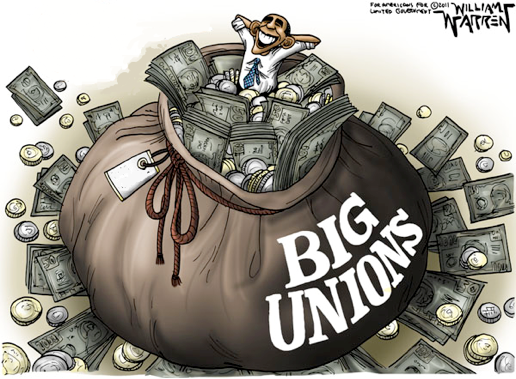Public sector unions have long exploited taxpayers by pushing for higher taxes, higher spending, and generous benefits and extravagant pensions for government workers while opposing measures to hold bureaucrats accountable. Fortunately, the U.S. Supreme Court’s Janus decision, which gave government workers a choice of whether to belong to a public employee union, has started to erode some of these unions’ excessive power. Yet much work remains to be done to make government bureaucracies more efficient and responsive to elected officials and to the public.
Although the public sector is much smaller than the private sector, public sector union members make up nearly half of all union members. In fact, of the nation’s 14.8 million union members, there are 7.2 million public sector union members and 7.6 million private sector union members. The near parity between public sector union membership and private sector union membership is only possible because the union membership rate is more than five times higher in the public sector than in the private sector: 34.4 percent of the public sector is unionized while only 6.5 percent of the private sector is unionized.
The five largest public employee unions, which claim to represent several million current and former government workers, are the National Education Association (NEA), the American Federation of Teachers (AFT), the American Federation of State, County and Municipal Employees (AFSCME), the Service Employees International Union (SEIU), and the American Federation of Government Employees (AFGE). Of these five unions, every single one endorsed Hillary Clinton for president in the 2016 election and Barack Obama for president in both the 2008 and 2012 elections. Each union of these unions also spends heavily on political campaigns and lobbying. During this election cycle alone:
- NEA has spent over $6.3 million on political contributions and over $4.1 million on lobbying;
- the AFT has spent over $17.4 million on political contributions (with none going to Republicans) and over $2.8 million on lobbying;
- AFSCME has spent over $6.8 million on political contributions and over $3.6 million on lobbying;
- SEIU has spent over $5.8 million on political contributions (with none going to Republicans) and over $600,000 on lobbying; and
- AFGE has spent nearly $3.7 million on political contributions and over $3 million on lobbying.
This past May, President Trump issued three executive orders to deal with some wasteful practices in the federal bureaucracy, including public employee unions’ free use of taxpayer-funded office space, numerous federal employees conducting union business on government time, and lengthy firing processes for underperforming federal workers. Unfortunately, an Obama-appointed judge struck down most of the substance of these executive orders last month. This decision should be speedily appealed.
Regardless of whether that decision is overturned or not, Congress should vote on the MERIT Act, which would allow for the firing of federal bureaucrats on an expedited basis — while still providing due process rights. Because public sector unions are so supportive of Democrats, Democrats can be expected to obstruct almost any attempts to rein in public sector unions or to streamline the removal of incompetent bureaucrats. For this reason, Republicans should seek opportunities to attach commonsense labor and civil service policy riders to must-pass legislation.
With their political expenditures and lobbying efforts, public employee unions have for too long swayed federal policy, making it impossible to rein in the administrative state and reduce the size and scope of government. President Trump’s steps to limit the power of these unions have been largely stymied, at least for the time being, by a hostile federal district judge. Now Congress should act to break the public employee union stranglehold on the bureaucracy and help ensure lasting civil service reform.
Richard McCarty is the Director of Research at Americans for Limited Government.







